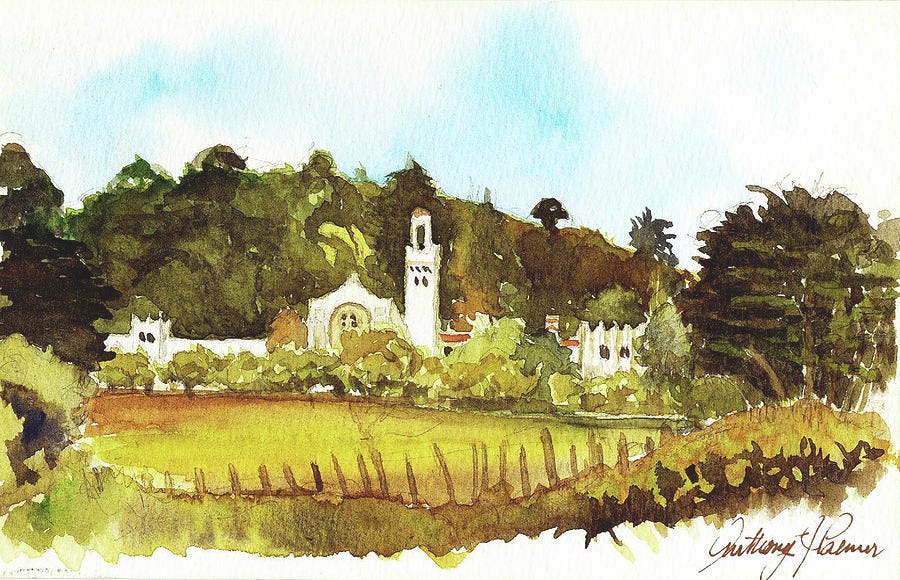On Prayer: A Safe Harbor in the Catholic Tradition
As my prayer life grew, I found the Evangelical world didn't have advice on prayer, to stay safe in prayer. I found it in the Catholic tradition, which I later learned is consistent with Orthodoxy.
Having been involved in New Age alternative spirituality before becoming Christian, I had learned from experience there is spiritual deception in this world, was concerned not to fall into it again while embarking on the Christian prayer life. I found no help in the Evangelical world, but I did find help in the Catholic world, in ways I later found are consistent with Orthodox teaching, something I have carried with me and am grateful for.
This post is third in a short occasional series. Click here to read the previous post.
There were many good things I received in Catholicism, and I am grateful to have been Catholic for as long as I was. There is one thing I’d like to write about here, something that has kept me safe in all my spiritual endeavors since, found in the older Catholic prayer tradition (and thus closer to Orthodoxy). Something I think all kinds of Christians can benefit from, regardless of what part of the Christian world you’re in.
Specifically, a certain aspect of teaching on prayer originating in the very early Church, brought forward in the West in the writings of St. John of the Cross, who in the 16th century was a co-founder of the Discalced Carmelite Religious Order (men and women who live lives of prayer in monasteries away from the world).
There are others who teach the same or similar East and West, before and after St. John. But it was he who first introduced me to certain critically important teachings with respect to prayer, his principles very helpful to me. I’ll focus on these here.
Seeking the Catholic Prayer Tradition
As background, prior to becoming a Christian, I had spent many years seeking God in non-Christian kinds of religion and spirituality, and learned through bitter experience that there is such a thing as spiritual deception. Things that appear very beautiful and feel very good, while leading one down a path into real darkness (as the bible says, Satan can appear as an angel of light).
The day I accepted Christ, I rejected and renounced all of it. And was very concerned not to go there again.
But over time, reading and praying the bible daily as I was, I began to have beautiful experiences during prayer, of inspiration and uplift, things that seemed to be coming from the Lord.
But were they? I had been deceived before. How could I know they were truly from the Lord? Or tell if it was deception?
Problem was, no one in the Evangelical world had any advice for me. There is no prayer tradition in the Protestant world, no body of received wisdom handed down to guide subsequent generations, because tradition had been deemed “man-made” and done away with.
That absence led in time to the first thing that led to my interest in Catholicism: mention one day by a co-worker who was Catholic of what she called the “Catholic prayer tradition.” It caught my attention, and I asked her about it, though only got a vague response (because, as I later learned, few Catholics today actually know their own prayer tradition, sadly including in seminary formation, a source of real problems in Catholic life I’ll discuss elsewhere).
But I didn’t forget it, and later, after I became Catholic, began to look for and ask about it.
To my surprise, no one seemed to know anything about it. No one directed me to any reading or teaching about it. Not even the director of the Third Order Carmelites in my area (lay associates of the Carmelite religious order). If any mention of St. John of the Cross came up, it was only to say, “He’s too hard to understand.”
It wasn’t until a couple years after becoming Catholic, having found no guidance elsewhere, that his book, or rather his collected works in a book called The Collected Works of St. John of the Cross, fell into my hands in what I can only describe as a work of heavenly intervention.
And for which I am extremely grateful. As I flipped open those first pages, I realized I had finally found what I was looking for. Specifically and most helpfully, what not to do if certain kinds of spiritual experiences start to happen in the course of prayer, advice given to beginners and those just starting to advance in prayer in The Sayings of Light and Love and The Ascent of Mt. Carmel. Advice meant to keep one safe as one advances in prayer, and not go off into one dangerous extreme or another. It is the most valuable advice I’ve ever been given on prayer, has kept me on the straight and narrow ever since.
This is especially important given that, in both Catholic and Protestant worlds, there is a great deal of seeking of spiritual experiences of various kinds. Done in ignorance of this teaching, it is very problematic, has caused a great deal of problems in both these worlds, problems I’ve personally encountered along the way, that would be easily avoided if only this teaching were better known.
Teaching which, I learned later, is entirely consistent with Orthodox teaching on the same subject. It is rooted in the experiences of Christians at prayer going back to the earliest centuries of the Church and the hermits of the desert, a highly developed wisdom born of experience and handed down to subsequent generations in the prayer traditions of both Eastern and Western Christianity.
I’ll jump straight to the heart of it, discussing what I call my two basic “rules of thumb” for staying safe in prayer, summarized from St. John’s teachings. The first is what to do when really good-feeling things happen; the second what to do when prayer is difficult, dry or distracted.
Rule One: What to Do When Really Good-Feeling Things Happen
First: Regardless of all the good-feeling things that can happen during prayer, don’t get caught up in them, attached to them, prolong them, or try to repeat them again in future. Rather push them away and avoid them, remaining focused on God alone in faith, regardless of feelings and experiences.
This may seem counter-intuitive, but it’s one of the most important teachings on prayer, critical to staying safe in prayer. Many good-feeling things can happen during prayer, including visions, locutions (hearing words or messages that seem to be spoken by Jesus, Mary or a saint), imaginations, intellectual understandings, feelings of inspiration and uplift of many kinds, and many other things.
The simple rule of thumb is: If they happen, push them away and avoid them. Refuse to get attached to them, don’t try to prolong them, and don’t try to make them happen on your own or repeat them in future, that is very dangerous (I’m sad to say that would include things much sought after in the Protestant Pentecostal and Catholic Charismatic Renewal movements, something I might write about another day).
This is because, as has been observed in prayer throughout the ages, there are deceiving spirits who can give beautiful spiritual-seeming experiences and messages, leading one astray into harmful things, errors, and possible delusion.
And, the human mind is complex, can manufacture or add to things even if they are from God, color or change them. To become attached to, try to prolong or make them happen again later by your own effort can open you up to deceiving spirits or the vagaries of your own imagination, and many different kinds of harm can result.
Becoming attached to them can cause you to unawarely become attached to feelings of spiritual sweetness, a kind of sensory pleasure, like a candy addict seeking the feeling of sweetness instead of seeking God alone in faith. How much trouble could be avoided if only people stopped running after spiritual “experiences” of various kinds, sought God alone in faith!
But God can and does give beautiful experiences in prayer to many people. Should we push them away, if they might be from God? How can that be good?
St. John explains: If they are from God, He has the intended effect in your soul the moment they happen. His work is already done. Pushing it away and refusing to get attached to the experience, staying focused on Him alone, is very pleasing to Him. He knows you are doing it to make sure you are focused solely on Him, taking care to avoid being misled by anything else.
So, in sum, if it’s not from God, pushing it away protects you from deception and harm, either spiritual or from your own mind. If it is from God, it has already had the effect He intends, and He is pleased at the care you take to keep seeking Him alone in faith, rather than getting caught up different experiences along the way.
Rule Two: What to do when Prayer is Difficult, Dry or Distracted
Second: If prayer seems difficult, dry, or distracted, don’t stop praying. Keep trying, even if it feels like you’re not praying at all. This is extremely important.
Dryness and distraction are common in the prayer life, can happen for a variety of reasons – but it doesn’t mean nothing is happening or you aren’t praying, so long as you continue to try. It can mean God is doing deeper things in your soul than you can feel, purifying things at deep levels, to make room for more of His grace in your soul (if so, and you give up and stop praying, you interrupt His work).
Now, this assumes you’re really living your faith, engaging in prayer regularly, attending church, confessing and repenting of sin, and haven’t fallen into some kind of regular sin or dissipating habit that can put you in a bad spiritual state and really interfere with the ability to pray (if you have, you need to clean it up if you want to develop your prayer life).
Assuming all else is well, the most important thing to do during times of dryness and distraction is to keep on praying, or trying to pray, regardless of how it feels. Even if it feels like you’re not praying at all, your mind chattering and wandering around all over the place. It doesn’t matter. Set a timer if you must for the allotted time, and don’t let yourself get up until it goes off, no matter how dry or distracted you feel.
If something pops into your mind that seems important to get up and do right now (I suffered that repeatedly in prayer for years), keep a pad of paper and a pen next to you and jot it down so you can remember to do it later. I used to wind up with a list of about six different “urgent” things by the end of my prayer time, but the vast majority of times when I looked at it later, I realized none of them were important at all!
If this happens, it is most likely a deceiving spirit pulling at you, trying to keep you from prayer. There is a story from St. Benedict of Nursia’s life, recorded by St. Gregory the Great, of a monk who was unable to stay in church praying with the brothers, would always get up and leave, wandering around outside during the hours of prayer. St. Benedict followed him out one day and saw a small black boy – a demon! – pulling at him and leading him around!
Smartphone addiction can also be a real problem, especially for younger people who’ve grown up with them (and are immersed in social media). If this is a problem for you, turn it off and put it on the far side of the house in a deep drawer or high shelf, somewhere it’s hard to get at. You will survive the deprivation, and if you do it daily will come to appreciate the peacefulness and calm that will come to mind and soul when away from it.
The key is to just keep praying or making the effort to pray, doing whatever you need to do to keep yourself sitting there trying. If you do, deep work can be happening in your soul you might not even be aware of until much later. If you don’t, you will make no progress and will slip backwards in the spiritual life - because there is no standing still in the spiritual life. You are either moving forward in prayer by working at it, or slipping backwards if you don't.
The One Thing Necessary
This teaching on what to do and what not to do during prayer, simple and yet so powerful, relieved me of the need to try to figure out if something was coming from the Lord or not. I didn’t have to worry about it at all. So much simpler and safer to just push it all away, maintain detachment from it and stay focused on the Lord alone in faith.
Plus it helped me recognize and avoid getting caught up in certain kinds of weirdness I encountered here and there in the Catholic world that contradicted St. John’s teaching. And helped me keep going during real times of dryness and distraction, not give up. In other words, it helped me stay safe in the prayer life.
Above all, it helped me focus on the one thing necessary: Jesus Himself, contemplating Him in faith regardless of how I felt, good or bad. What St. John of the Cross calls the darkness or nakedness of faith, in which we strip ourselves of all sensory experiences in prayer, good or bad. Like Mary sitting quietly at the feet of Jesus, while her sister Martha was caught up in all kinds of distractions, getting frustrated and becoming resentful because of it.
As St. John says, if you practice this, not getting caught up in all the good experiences that can happen during prayer, and not giving up during the difficult times, you not only stay much safer in prayer, but you grow much faster spiritually. It seems counterintuitive, but it is true. Avoiding extremes helps you grow faster in prayer toward real union with God, because you don't let yourself go astray into distractions, temptations, feelings of sweetness or delusions. It helps you stay on the straight and narrow, focused on Jesus alone in faith as you quietly pray and let Him work in your soul in His own way and time.
Only many years later I began to encounter Orthodox Christian teaching on prayer, and was surprised – and relieved, given its importance – to see great similarities with St. John of the Cross. Different language and methodology, but the underlying concepts are strikingly similar, especially in the Philokalia (a compendium of centuries of writing on the spiritual life by Orthodox spiritual masters going back to the fourth century).
If anything, the Orthodox are even more strict with the prayer life. They do not allow the kind of experiments and deviations from tradition that have happened elsewhere, including in the Catholic Church in recent decades despite St. John’s warnings. They remain deeply rooted in the ancient prayer tradition itself, because such a proven safe and secure way. One of many things that began to interest me in Orthodoxy.
I learned only much later that St. John of the Cross apparently studied the Early Church Fathers. They must have made a great impression on him, especially with respect to prayer. How I wish he were better known within his own Catholic tradition! His cautions are a true safe harbor in the spiritual life. I am grateful for all he gave me, as it has provided such an important foundation and good habits of prayer that keep me safe, that I now expand and build on in the Orthodox world.








